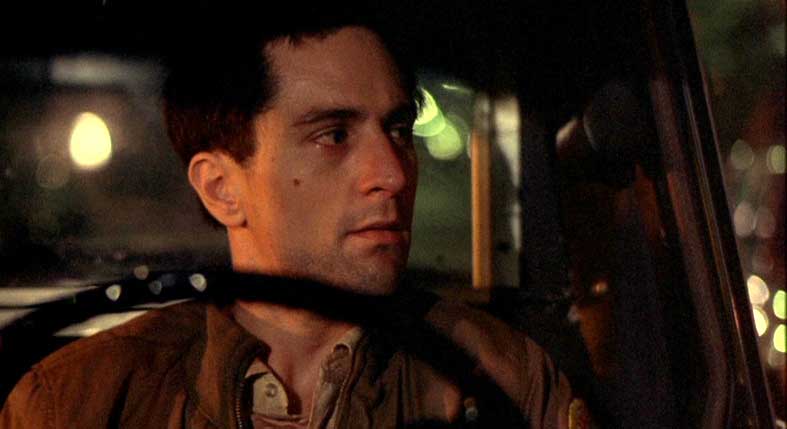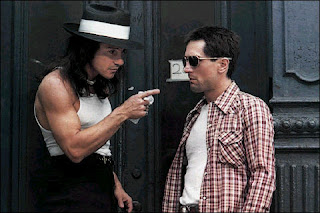I have never been a fan of Martin Scorsese’s work.
Not that I hate it; I have just only ever seen 2 of his films, one of which is
this one, the other film being Hugo.
I respect the man for the influence he has had, but his works have never really
interested me enough to actively seek them out. Hell, the only reason I saw Hugo was because my family decided to
make a family-fun night out of watching the film. As such, I went into this
film not knowing what to expect. All I knew is that it is considered important
enough to be put in the National Film Registry and that there is a brutal shoot-out
at the end. Still, I like to seek out and watch films that others consider good,
so I decided to give this a go. When I finished the movie, I just sat there,
shaken. This movie tapped into a part of my mind that I have not seen or even
considered in a very long time. It is a very dark, very unnerving film, and I
feel that I have walked away a different person than the one I was before I
watched it.
Taxi
Driver is the story of one Travis Bickle. He is an
insomniac Vietnam vet who, of course, drives a tax for a living. The film
follows Travis’s gradual mental deterioration over a period of weeks and
chronicles his stilted, awkward interactions with a beautiful political campaign
volunteer and an underage prostitute. The film ends with a climactic, brutal
final shootout between the prostitute’s pimp, Travis, a bouncer, and one of the
pimp’s henchmen. Once the smoke clears, three people lay dead and Travis
himself lies near death, suffering from multiple gunshot wounds.
Travis is trying out his Dirty Harry cosplay.
The film expertly builds to the finale, with the
music giving the events of the film a sense of foreboding and dread. The viewer
knows a storm is coming, even if they do now know what form it will take. The
violence slowly builds as well, starting with discussions of violence and
murder by various characters (fellow cabbies talk about another cab driver who
was injured, a man Travis is driving discusses murdering his wife), slowly
moving to an underage prostitute fighting with her pimp, to Travis shooting a man
trying to rob a store, before eventually entering into the ultra-violent finale.
The cinematography also adds to the tension, with multiple interesting shots that
were far ahead of their time, the most memorable of which is a slow motion pan
near the end of the film that emphasizes and gives the viewer time to reflect
on the violence.
Still, not all will appreciate the film. The film
progresses fairly slowly, which might bore some. The violence itself is not
even close to being on the level of something like RoboCop; the shoot-out at the end is quick and brutal, and while it
is very gory, it is not absurdly so. The film’s plot can be scattered,
switching between one thread and the next, which might confuse some and anger
others. Those wanting a traditional, “heroes journey” style plot structure will
walk away disappointed as well. Travis’s character does not really “evolve” or
even change; he ends at the same place he began and it still seems entirely
possible that he will slip back into violence and madness. This is not really a
bad thing; sometimes people just never change, not matter how much bad stuff
happens to them, but it still might anger those who expect the film to end in a
different place than where it began.
Hey, eyes on the road idiot! You want to get us all
killed?
Even though the theme of violence is central to the
film, it is not its focus; the focus lays squarely on Travis Bickle and his
reactions to, and use of, violence. Robert de Niro does an excellent job as
Travis, giving humanity and believability to a character that does a number of
inhuman and hard to believe things. Travis himself touches a familiar cord. He
is awkward and shy, but well meaning. Yet, he is also creepy, following around
and spying on his romantic interest at her job and taking too much of an
interest in the private lives of those he sees only briefly. He often clumsily
tries to insert himself into the lives of others, whether they want him to or
not. He fantasizes about others, building up all sorts of assumptions and
fabrications about their lives inside his head. When he does try to talk to
those he fantasizes about, he tries to talk to those people as if they were the
fantasies, not the people he is actually talking too, and he does not take the
time to learn who they really are.
For instance, in one scene, he is talking to the campaign
volunteer right after the two have met. He makes all sort of strange
assumptions about her feelings that he cannot possibly know: that she is lonely
and in need of a friend, that she does not like a man she works with and is
often seen talking with, that she only wants love, etc. She seems to think his
assumptions are cute at first, but she slowly grows less comfortable around him
and stops seeing him after he takes her to a pornographic film for a date,
assuming that because she said she liked movies she would like all kinds of
movies. Travis does not understand this, gets frustrated, and begins to stalk
her, constantly calling her and sending her flowers. He eventually visits the
office and confronts her. When he does, he gets violent and is thrown out.
After that, he decides to devote himself to assassinating the political candidate
she is volunteering for to get revenge on her for spurning him.
Travis encounters a member of the dangerous “Grease”
gang.
These events lead into another key aspect of Travis’s
character: he is vengeful and fetishes violence to an uncomfortably familiar
degree. He is often found standing in front of his mirror, practicing acting
tough and bad-ass, even going so far as to get a Mohawk at the end to look like
a hard-ass. He fantasies about fighting random thugs who decide to provoke him
into fighting street fights and getting into shoot-outs with gangsters. He even
goes so far as to purchase multiple fire-arms in an attempt to feel powerful.
Once he has them, he spends hours shooting them at a shooting range and
practicing drawing them from the many holsters he has strapped to his body. He
even designs a device that allows him to hide a gun in his coat sleeve, and
then when he presses a button it instantly puts it in his hand, in the off
chance that he will ever need to instantly draw his gun.
Travis and his reactions are supremely disconcerting
and disturbing; not just because the man is obviously mentally unhinged, but
because many of the things he does hit far too close to home. I know that I too
have built up fantasy versions of other people in my head, and then when I interact
with those people in real life, I try to interact with the fantasy version more
often than the actual person. I too try to insert myself into the lives of
others because of the misguided idea that I am somehow more qualified to help
them than someone else. I too have fantasized about getting into awesome fights
in the street and totally kicking the other guy’s ass. It makes me greatly
relate to the character, which makes it all the more uncomfortable when the
finale comes around. If it only took that little to push Travis Bickle to outright
murder three people, what does that say for me? Could I too become a murderer
that easily? What the hell is stopping me from becoming one, if that is the
case? Is everyone capable of horrible violence? Does fetishizing violence by
making it seem “cool” make it easier to be violent? We like to say to ourselves
“we would never do that, not even if pushed”, but could we be perhaps being
lying to ourselves? The film seems to offer no answers to these questions,
instead putting them out there and leaving the viewer to ponder them once the
film is over.
No Travis! Shooting people is for later in the
movie!
Taxi Driver is one of the most disturbing and
unnerving films I have seen in a while. It sets itself apart from all of the
other “white guy snaps and kills a bunch of people” movies, like Death Wish, by focusing much more on the
character of Travis and making sure he feels like a real, relatable human (albeit
a slightly creepy one). The end result of this it that it makes the viewer more
attached, connected, and invested in the character that when he finally cracks it
forces the viewer to ask many uncomfortable questions of themselves and their
feelings towards violence. It is an
expertly crafted film with a great score, great acting, and great cinematography.
I highly recommend this film to anyone seeking a film about the nature of
violence. It may not be fun and it is definitely not for everyone, but it is
important and well worth anyone’s time.
Final Rating: Depression/10
Breakfastman is an amateur reviewer,
student, and all around cool guy. Questions, comments, constructive criticisms,
rants, rages, or just want to tell me my taste in music sucks? All forms of
feedback are encouraged, so feel free. All images blatantly stolen from Google.





No comments:
Post a Comment